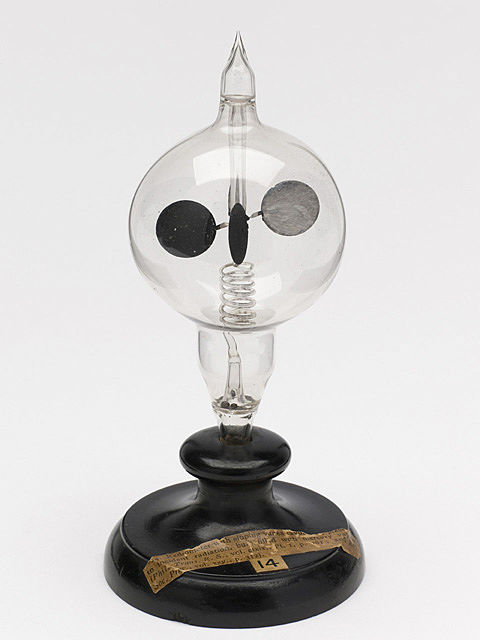Science
Researchers Explore Photophoresis to Lift Metal Sheets into Atmosphere

A team of researchers has proposed an innovative approach to leverage the photophoresis effect to elevate metal sheets into the upper atmosphere. This concept, which builds on the principles demonstrated by the Crookes radiometer, could enable the development of probes that operate in the mesosphere, a region too high for balloons and too low for satellites.
The Crookes radiometer, often misrepresented in explanations, operates not through radiation pressure but via photophoresis. This phenomenon occurs when there is a temperature difference between the dark and light sides of the radiometer’s blades. The dark side, absorbing more heat from light sources, causes gas molecules to gain thermal energy and escape faster, resulting in a pressure difference that drives the blades to spin.
In an effort to harness this effect for practical applications, researchers have designed a configuration termed “nanocardboard,” consisting of two thin metal sheets—one dark and one light—arranged parallel to each other. These sheets are perforated to reduce weight, and some include connecting pipes that enhance thermal insulation and airflow, thereby optimizing lift.
The research team created a model to evaluate various configurations and maximize the lift generated by the system. Key parameters included the geometry of the sheets, the density of perforations, and ambient gas conditions. The study found that the ideal conditions for lift are similar to those inside a Crookes radiometer, which operates at significantly lower atmospheric pressures than those at sea level.
The findings revealed that a square millimeter of nanocardboard could produce over ten times more lift per unit area than larger pieces. The optimal lift occurs in the mesosphere, situated between 50 and 100 kilometers above Earth, where conditions favor the effectiveness of the photophoretic effect.
In practical trials, the researchers fabricated lightweight sheets from materials such as chromium and aluminum oxide. When exposed to a laser or bright light, these sheets successfully generated measurable lift in a controlled, low-density atmosphere, demonstrating the potential of this technology.
Despite the promising results, achieving practical applications poses significant challenges. The mesosphere is difficult to explore, as it lacks the density required for balloons yet has enough gas to hinder satellites. The team envisions transforming these devices into instrument-carrying aircraft, which would necessitate adding structural components for stability and payload capacity.
Launching these devices into the upper atmosphere remains a hurdle, as they cannot generate sufficient lift at lower altitudes. They would need to be transported to the stratosphere using another vehicle and released gently to avoid structural damage. Additionally, any deployment during nighttime could result in the devices descending rapidly back to the surface.
While the path to practical implementation is fraught with challenges, the research offers exciting possibilities. The principles of photophoresis might not only provide new insights into atmospheric science on Earth but also potentially extend to exploration efforts on other planets, such as Mars. This research underscores the fascinating interplay between light and physical phenomena, paving the way for future advancements in atmospheric technology.
-

 Education3 months ago
Education3 months agoBrandon University’s Failed $5 Million Project Sparks Oversight Review
-

 Science4 months ago
Science4 months agoMicrosoft Confirms U.S. Law Overrules Canadian Data Sovereignty
-

 Lifestyle3 months ago
Lifestyle3 months agoWinnipeg Celebrates Culinary Creativity During Le Burger Week 2025
-

 Health4 months ago
Health4 months agoMontreal’s Groupe Marcelle Leads Canadian Cosmetic Industry Growth
-

 Science4 months ago
Science4 months agoTech Innovator Amandipp Singh Transforms Hiring for Disabled
-

 Technology4 months ago
Technology4 months agoDragon Ball: Sparking! Zero Launching on Switch and Switch 2 This November
-

 Education4 months ago
Education4 months agoRed River College Launches New Programs to Address Industry Needs
-

 Technology4 months ago
Technology4 months agoGoogle Pixel 10 Pro Fold Specs Unveiled Ahead of Launch
-

 Business3 months ago
Business3 months agoRocket Lab Reports Strong Q2 2025 Revenue Growth and Future Plans
-

 Technology2 months ago
Technology2 months agoDiscord Faces Serious Security Breach Affecting Millions
-

 Education4 months ago
Education4 months agoAlberta Teachers’ Strike: Potential Impacts on Students and Families
-

 Education4 months ago
Education4 months agoNew SĆIȺNEW̱ SṮEȽIṮḴEȽ Elementary Opens in Langford for 2025/2026 Year
-

 Science4 months ago
Science4 months agoChina’s Wukong Spacesuit Sets New Standard for AI in Space
-

 Business4 months ago
Business4 months agoBNA Brewing to Open New Bowling Alley in Downtown Penticton
-

 Business4 months ago
Business4 months agoNew Estimates Reveal ChatGPT-5 Energy Use Could Soar
-

 Technology4 months ago
Technology4 months agoWorld of Warcraft Players Buzz Over 19-Quest Bee Challenge
-

 Business4 months ago
Business4 months agoDawson City Residents Rally Around Buy Canadian Movement
-

 Technology2 months ago
Technology2 months agoHuawei MatePad 12X Redefines Tablet Experience for Professionals
-

 Technology4 months ago
Technology4 months agoFuture Entertainment Launches DDoD with Gameplay Trailer Showcase
-

 Top Stories3 months ago
Top Stories3 months agoBlue Jays Shift José Berríos to Bullpen Ahead of Playoffs
-

 Technology4 months ago
Technology4 months agoGlobal Launch of Ragnarok M: Classic Set for September 3, 2025
-

 Technology4 months ago
Technology4 months agoInnovative 140W GaN Travel Adapter Combines Power and Convenience
-

 Science4 months ago
Science4 months agoXi Labs Innovates with New AI Operating System Set for 2025 Launch
-

 Technology4 months ago
Technology4 months agoNew IDR01 Smart Ring Offers Advanced Sports Tracking for $169










